Interventions for Preventing and Reducing Delirium: A Detailed Report
VerifiedAdded on 2021/02/20
|12
|3537
|67
Report
AI Summary
This report addresses the critical issue of delirium in acute hospital settings, a complex mental disability characterized by confused thinking and decreased awareness. It begins with a detailed search plan to identify relevant resources, followed by a comprehensive literature review using a structured search strategy, including databases, books, journals, and websites. The core of the report comprises an extraction/summary table for each paper, meticulously outlining the purpose, sample, design, methodology, key findings, and level of evidence. The report then synthesizes the research to provide recommendations for best practices in delirium prevention, focusing on the introduction of the problem, critical analysis of the research, summarization of key findings, and evidence-based interventions. The report examines the causes of delirium, including severe illness, metabolic changes, infection, surgery, medication, and substance withdrawal, and addresses the different categories of delirium: hyperactive, hypoactive, and mixed. The final section of the report provides recommendations for best practices to prevent delirium in acute hospital settings. The report emphasizes the need for nursing staff to detect delirium and apply early interventions to reduce adverse events. It highlights the importance of early engagement of multidisciplinary staff and interventions on delirium incidence.
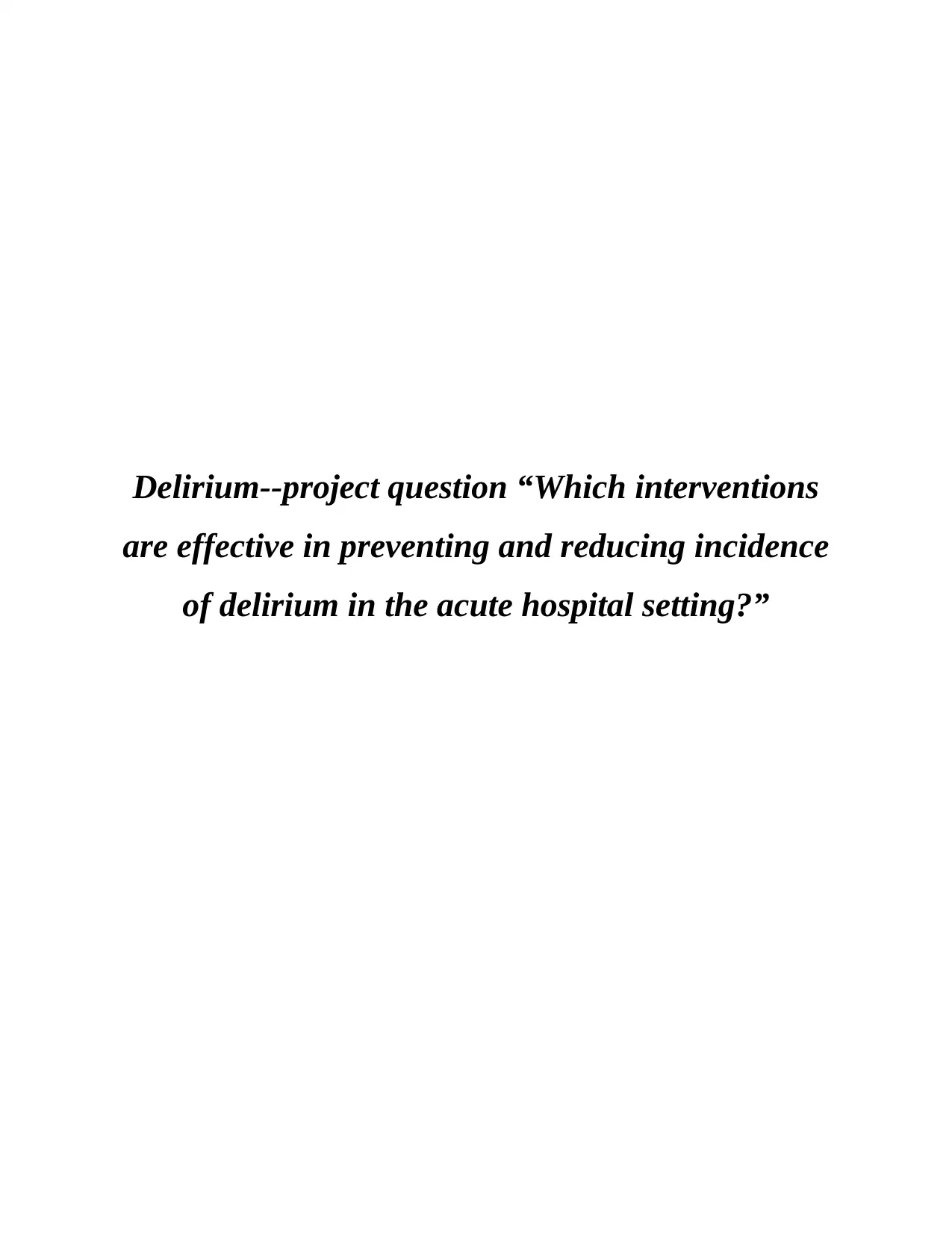
Delirium--project question “Which interventions
are effective in preventing and reducing incidence
of delirium in the acute hospital setting?”
are effective in preventing and reducing incidence
of delirium in the acute hospital setting?”
Paraphrase This Document
Need a fresh take? Get an instant paraphrase of this document with our AI Paraphraser
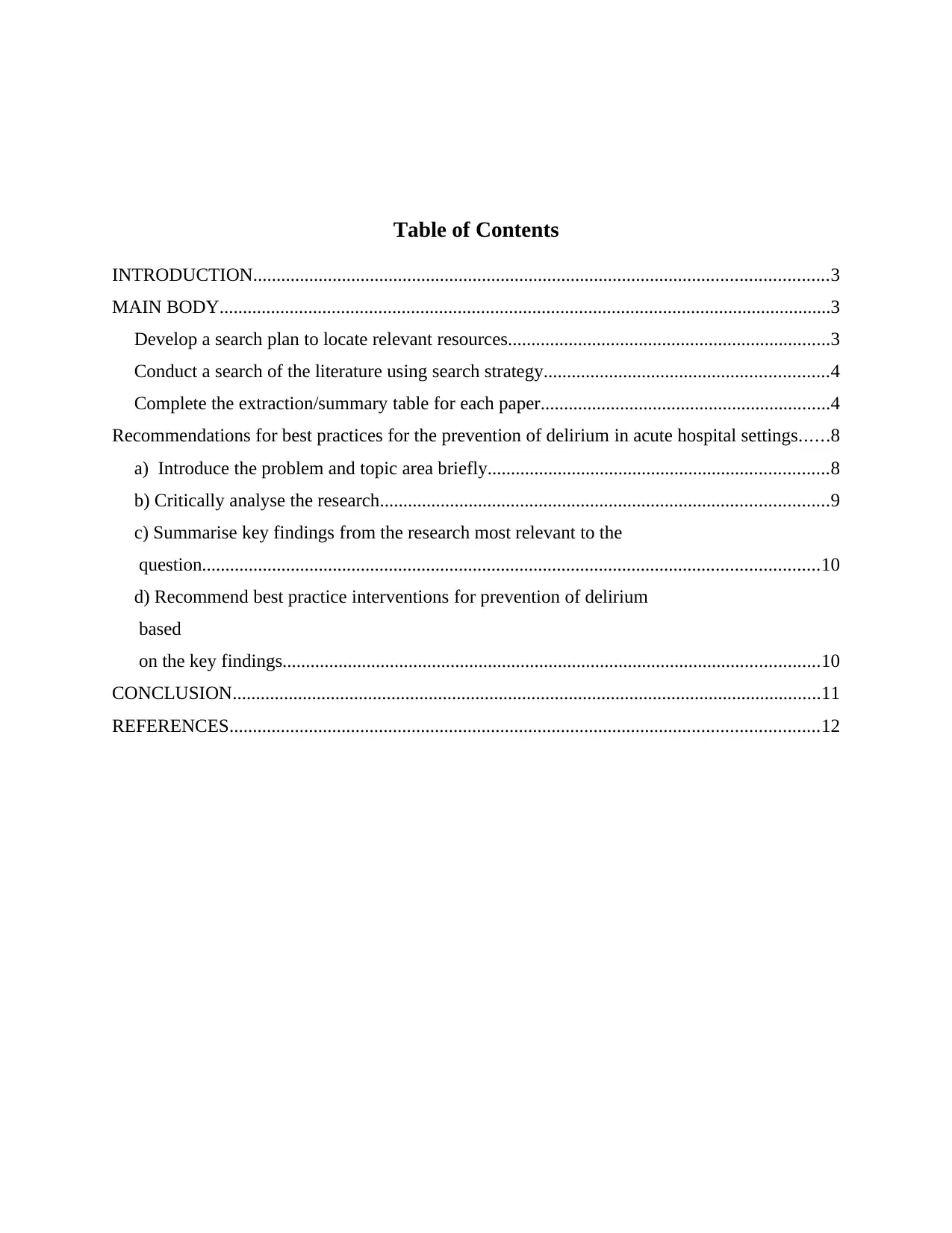
Table of Contents
INTRODUCTION...........................................................................................................................3
MAIN BODY...................................................................................................................................3
Develop a search plan to locate relevant resources.....................................................................3
Conduct a search of the literature using search strategy.............................................................4
Complete the extraction/summary table for each paper..............................................................4
Recommendations for best practices for the prevention of delirium in acute hospital settings......8
a) Introduce the problem and topic area briefly.........................................................................8
b) Critically analyse the research................................................................................................9
c) Summarise key findings from the research most relevant to the
question....................................................................................................................................10
d) Recommend best practice interventions for prevention of delirium
based
on the key findings...................................................................................................................10
CONCLUSION..............................................................................................................................11
REFERENCES..............................................................................................................................12
INTRODUCTION...........................................................................................................................3
MAIN BODY...................................................................................................................................3
Develop a search plan to locate relevant resources.....................................................................3
Conduct a search of the literature using search strategy.............................................................4
Complete the extraction/summary table for each paper..............................................................4
Recommendations for best practices for the prevention of delirium in acute hospital settings......8
a) Introduce the problem and topic area briefly.........................................................................8
b) Critically analyse the research................................................................................................9
c) Summarise key findings from the research most relevant to the
question....................................................................................................................................10
d) Recommend best practice interventions for prevention of delirium
based
on the key findings...................................................................................................................10
CONCLUSION..............................................................................................................................11
REFERENCES..............................................................................................................................12
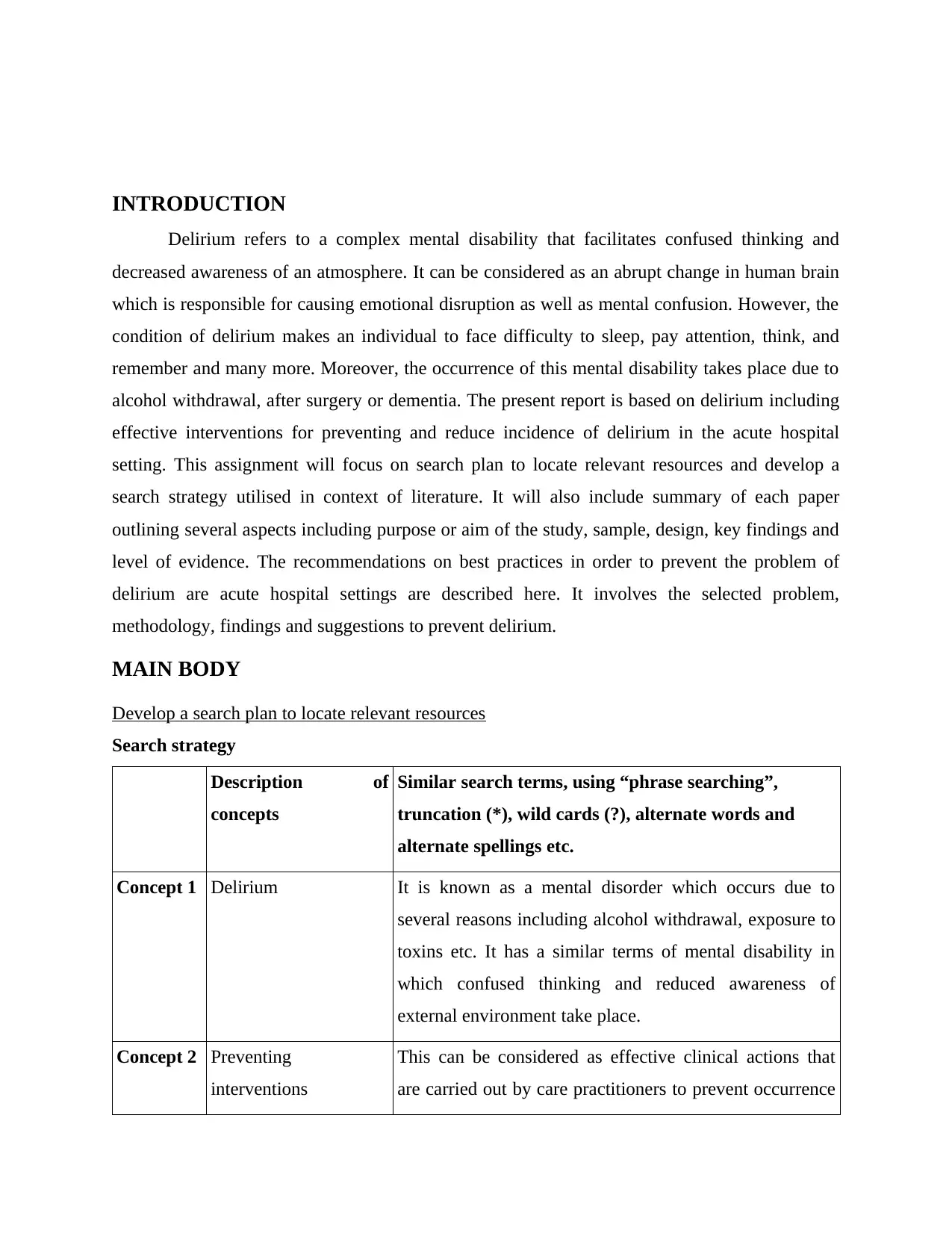
INTRODUCTION
Delirium refers to a complex mental disability that facilitates confused thinking and
decreased awareness of an atmosphere. It can be considered as an abrupt change in human brain
which is responsible for causing emotional disruption as well as mental confusion. However, the
condition of delirium makes an individual to face difficulty to sleep, pay attention, think, and
remember and many more. Moreover, the occurrence of this mental disability takes place due to
alcohol withdrawal, after surgery or dementia. The present report is based on delirium including
effective interventions for preventing and reduce incidence of delirium in the acute hospital
setting. This assignment will focus on search plan to locate relevant resources and develop a
search strategy utilised in context of literature. It will also include summary of each paper
outlining several aspects including purpose or aim of the study, sample, design, key findings and
level of evidence. The recommendations on best practices in order to prevent the problem of
delirium are acute hospital settings are described here. It involves the selected problem,
methodology, findings and suggestions to prevent delirium.
MAIN BODY
Develop a search plan to locate relevant resources
Search strategy
Description of
concepts
Similar search terms, using “phrase searching”,
truncation (*), wild cards (?), alternate words and
alternate spellings etc.
Concept 1 Delirium It is known as a mental disorder which occurs due to
several reasons including alcohol withdrawal, exposure to
toxins etc. It has a similar terms of mental disability in
which confused thinking and reduced awareness of
external environment take place.
Concept 2 Preventing
interventions
This can be considered as effective clinical actions that
are carried out by care practitioners to prevent occurrence
Delirium refers to a complex mental disability that facilitates confused thinking and
decreased awareness of an atmosphere. It can be considered as an abrupt change in human brain
which is responsible for causing emotional disruption as well as mental confusion. However, the
condition of delirium makes an individual to face difficulty to sleep, pay attention, think, and
remember and many more. Moreover, the occurrence of this mental disability takes place due to
alcohol withdrawal, after surgery or dementia. The present report is based on delirium including
effective interventions for preventing and reduce incidence of delirium in the acute hospital
setting. This assignment will focus on search plan to locate relevant resources and develop a
search strategy utilised in context of literature. It will also include summary of each paper
outlining several aspects including purpose or aim of the study, sample, design, key findings and
level of evidence. The recommendations on best practices in order to prevent the problem of
delirium are acute hospital settings are described here. It involves the selected problem,
methodology, findings and suggestions to prevent delirium.
MAIN BODY
Develop a search plan to locate relevant resources
Search strategy
Description of
concepts
Similar search terms, using “phrase searching”,
truncation (*), wild cards (?), alternate words and
alternate spellings etc.
Concept 1 Delirium It is known as a mental disorder which occurs due to
several reasons including alcohol withdrawal, exposure to
toxins etc. It has a similar terms of mental disability in
which confused thinking and reduced awareness of
external environment take place.
Concept 2 Preventing
interventions
This can be considered as effective clinical actions that
are carried out by care practitioners to prevent occurrence
⊘ This is a preview!⊘
Do you want full access?
Subscribe today to unlock all pages.

Trusted by 1+ million students worldwide
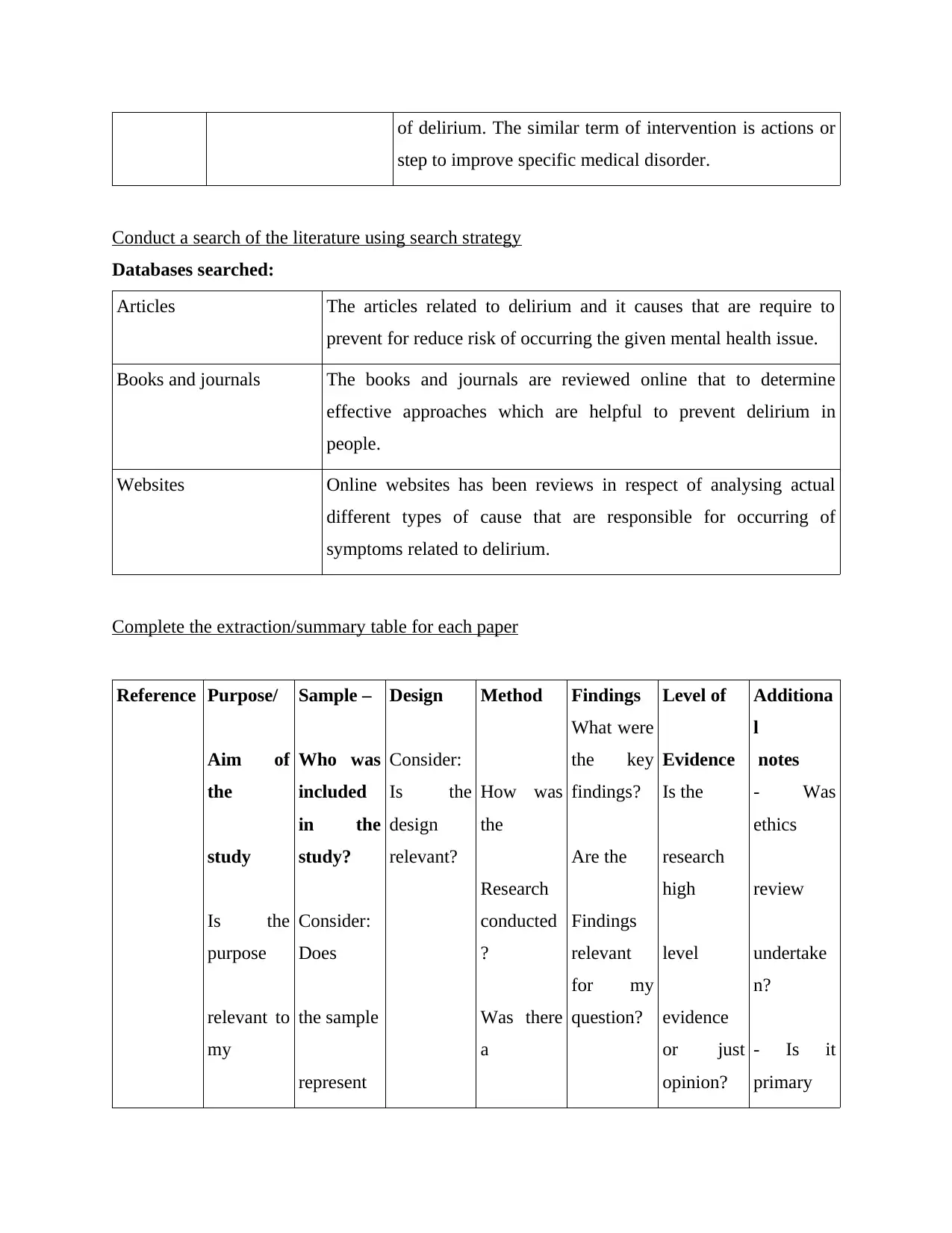
of delirium. The similar term of intervention is actions or
step to improve specific medical disorder.
Conduct a search of the literature using search strategy
Databases searched:
Articles The articles related to delirium and it causes that are require to
prevent for reduce risk of occurring the given mental health issue.
Books and journals The books and journals are reviewed online that to determine
effective approaches which are helpful to prevent delirium in
people.
Websites Online websites has been reviews in respect of analysing actual
different types of cause that are responsible for occurring of
symptoms related to delirium.
Complete the extraction/summary table for each paper
Reference Purpose/
Aim of
the
study
Is the
purpose
relevant to
my
Sample –
Who was
included
in the
study?
Consider:
Does
the sample
represent
Design
Consider:
Is the
design
relevant?
Method
How was
the
Research
conducted
?
Was there
a
Findings
What were
the key
findings?
Are the
Findings
relevant
for my
question?
Level of
Evidence
Is the
research
high
level
evidence
or just
opinion?
Additiona
l
notes
- Was
ethics
review
undertake
n?
- Is it
primary
step to improve specific medical disorder.
Conduct a search of the literature using search strategy
Databases searched:
Articles The articles related to delirium and it causes that are require to
prevent for reduce risk of occurring the given mental health issue.
Books and journals The books and journals are reviewed online that to determine
effective approaches which are helpful to prevent delirium in
people.
Websites Online websites has been reviews in respect of analysing actual
different types of cause that are responsible for occurring of
symptoms related to delirium.
Complete the extraction/summary table for each paper
Reference Purpose/
Aim of
the
study
Is the
purpose
relevant to
my
Sample –
Who was
included
in the
study?
Consider:
Does
the sample
represent
Design
Consider:
Is the
design
relevant?
Method
How was
the
Research
conducted
?
Was there
a
Findings
What were
the key
findings?
Are the
Findings
relevant
for my
question?
Level of
Evidence
Is the
research
high
level
evidence
or just
opinion?
Additiona
l
notes
- Was
ethics
review
undertake
n?
- Is it
primary
Paraphrase This Document
Need a fresh take? Get an instant paraphrase of this document with our AI Paraphraser
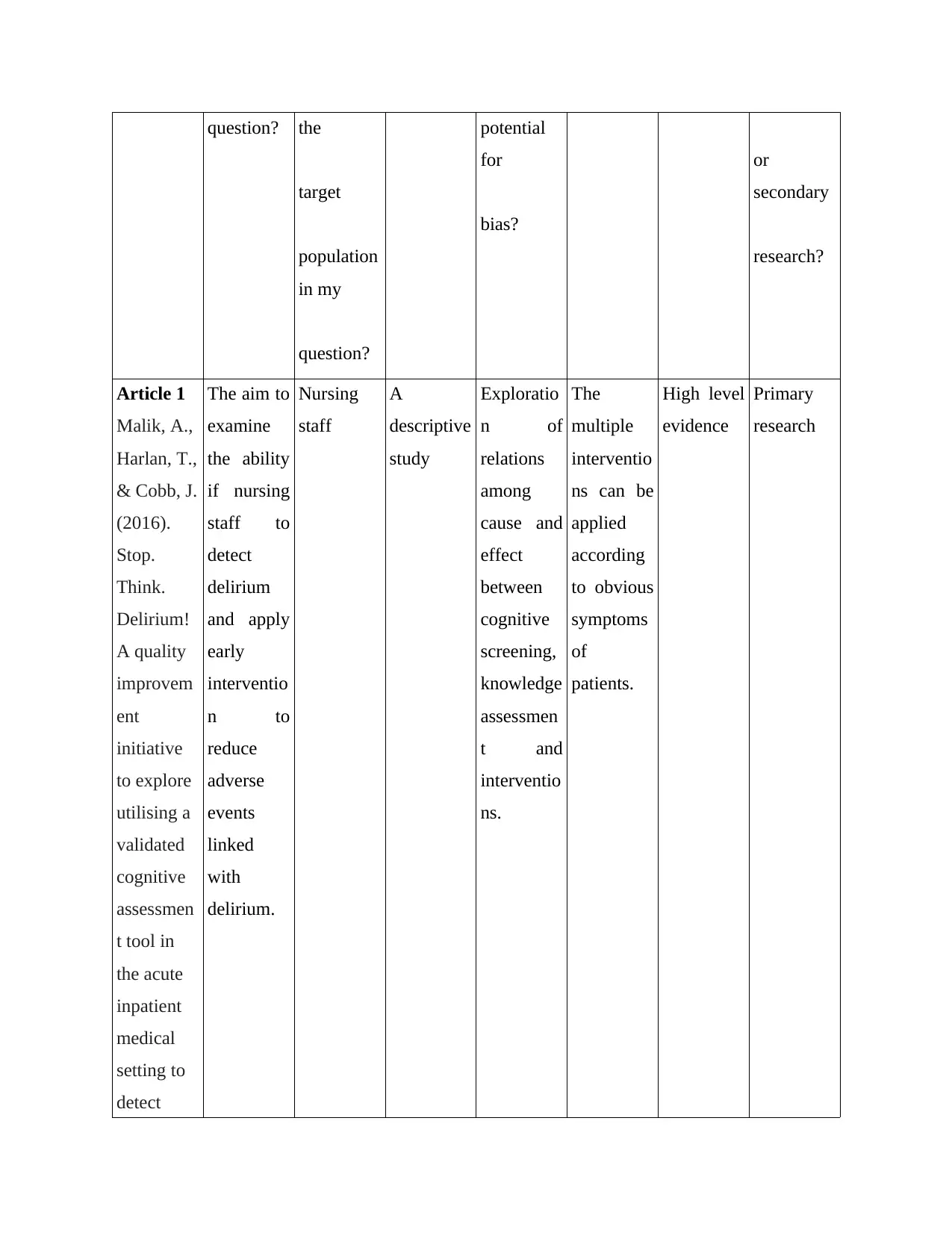
question? the
target
population
in my
question?
potential
for
bias?
or
secondary
research?
Article 1
Malik, A.,
Harlan, T.,
& Cobb, J.
(2016).
Stop.
Think.
Delirium!
A quality
improvem
ent
initiative
to explore
utilising a
validated
cognitive
assessmen
t tool in
the acute
inpatient
medical
setting to
detect
The aim to
examine
the ability
if nursing
staff to
detect
delirium
and apply
early
interventio
n to
reduce
adverse
events
linked
with
delirium.
Nursing
staff
A
descriptive
study
Exploratio
n of
relations
among
cause and
effect
between
cognitive
screening,
knowledge
assessmen
t and
interventio
ns.
The
multiple
interventio
ns can be
applied
according
to obvious
symptoms
of
patients.
High level
evidence
Primary
research
target
population
in my
question?
potential
for
bias?
or
secondary
research?
Article 1
Malik, A.,
Harlan, T.,
& Cobb, J.
(2016).
Stop.
Think.
Delirium!
A quality
improvem
ent
initiative
to explore
utilising a
validated
cognitive
assessmen
t tool in
the acute
inpatient
medical
setting to
detect
The aim to
examine
the ability
if nursing
staff to
detect
delirium
and apply
early
interventio
n to
reduce
adverse
events
linked
with
delirium.
Nursing
staff
A
descriptive
study
Exploratio
n of
relations
among
cause and
effect
between
cognitive
screening,
knowledge
assessmen
t and
interventio
ns.
The
multiple
interventio
ns can be
applied
according
to obvious
symptoms
of
patients.
High level
evidence
Primary
research
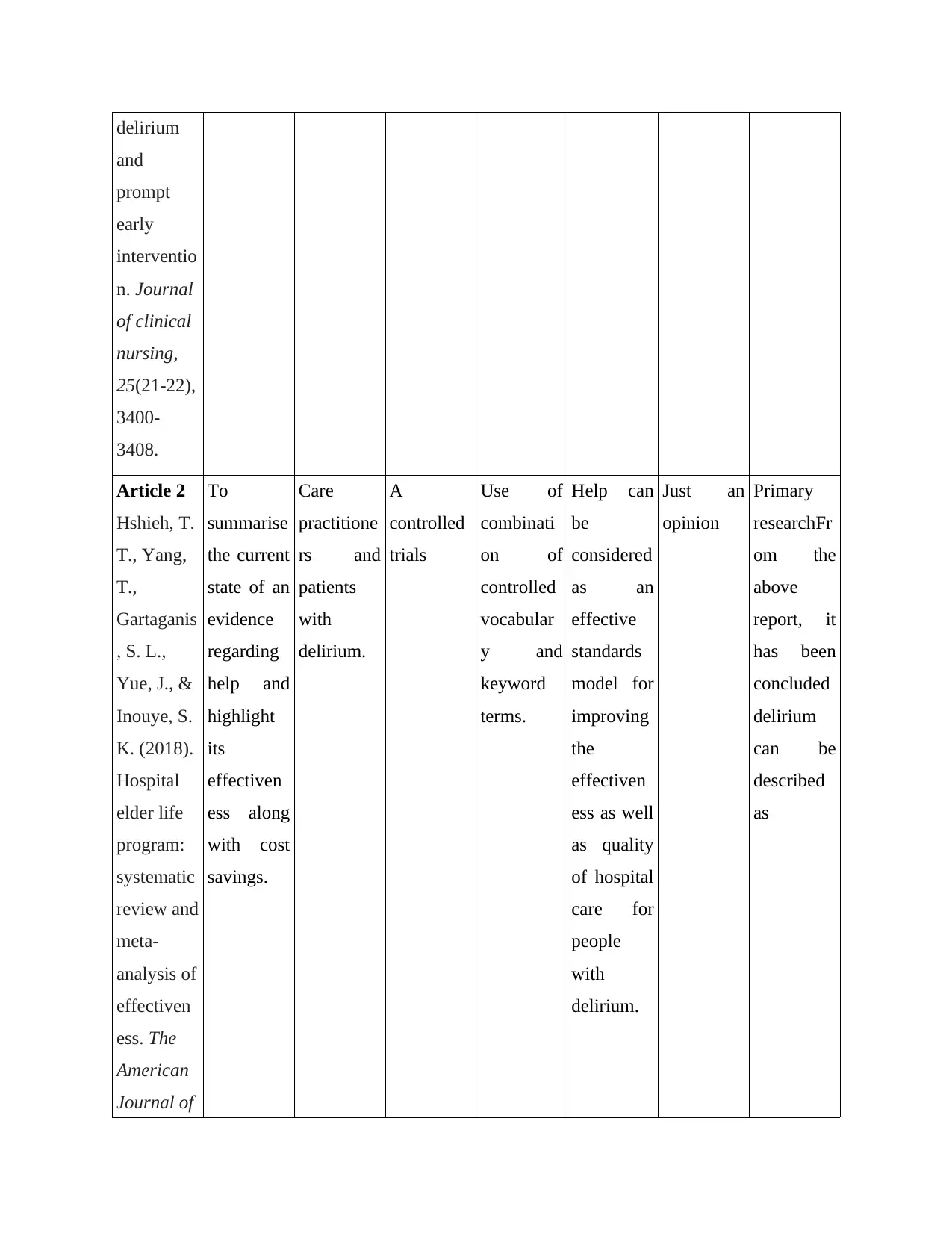
delirium
and
prompt
early
interventio
n. Journal
of clinical
nursing,
25(21-22),
3400-
3408.
Article 2
Hshieh, T.
T., Yang,
T.,
Gartaganis
, S. L.,
Yue, J., &
Inouye, S.
K. (2018).
Hospital
elder life
program:
systematic
review and
meta-
analysis of
effectiven
ess. The
American
Journal of
To
summarise
the current
state of an
evidence
regarding
help and
highlight
its
effectiven
ess along
with cost
savings.
Care
practitione
rs and
patients
with
delirium.
A
controlled
trials
Use of
combinati
on of
controlled
vocabular
y and
keyword
terms.
Help can
be
considered
as an
effective
standards
model for
improving
the
effectiven
ess as well
as quality
of hospital
care for
people
with
delirium.
Just an
opinion
Primary
researchFr
om the
above
report, it
has been
concluded
delirium
can be
described
as
and
prompt
early
interventio
n. Journal
of clinical
nursing,
25(21-22),
3400-
3408.
Article 2
Hshieh, T.
T., Yang,
T.,
Gartaganis
, S. L.,
Yue, J., &
Inouye, S.
K. (2018).
Hospital
elder life
program:
systematic
review and
meta-
analysis of
effectiven
ess. The
American
Journal of
To
summarise
the current
state of an
evidence
regarding
help and
highlight
its
effectiven
ess along
with cost
savings.
Care
practitione
rs and
patients
with
delirium.
A
controlled
trials
Use of
combinati
on of
controlled
vocabular
y and
keyword
terms.
Help can
be
considered
as an
effective
standards
model for
improving
the
effectiven
ess as well
as quality
of hospital
care for
people
with
delirium.
Just an
opinion
Primary
researchFr
om the
above
report, it
has been
concluded
delirium
can be
described
as
⊘ This is a preview!⊘
Do you want full access?
Subscribe today to unlock all pages.

Trusted by 1+ million students worldwide
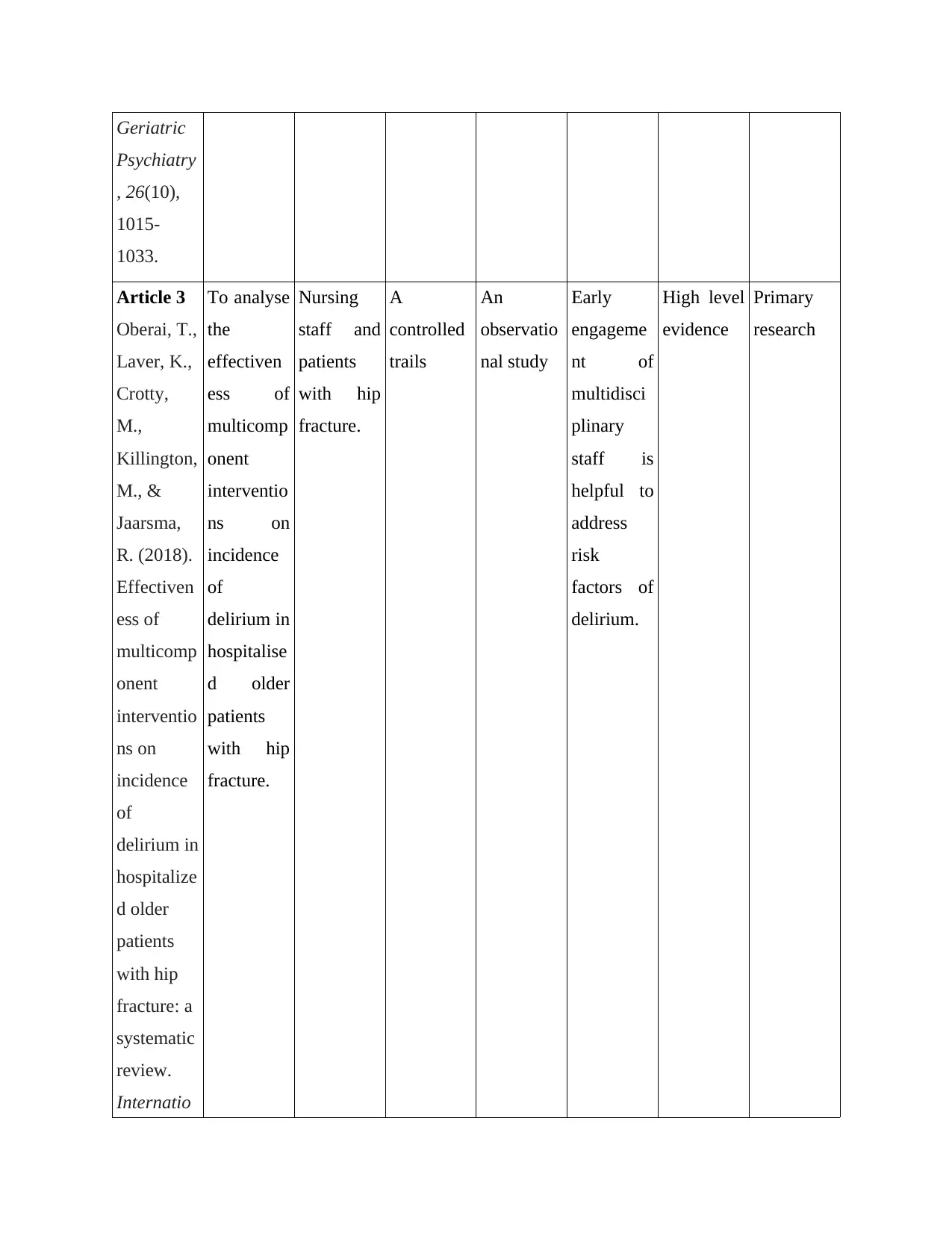
Geriatric
Psychiatry
, 26(10),
1015-
1033.
Article 3
Oberai, T.,
Laver, K.,
Crotty,
M.,
Killington,
M., &
Jaarsma,
R. (2018).
Effectiven
ess of
multicomp
onent
interventio
ns on
incidence
of
delirium in
hospitalize
d older
patients
with hip
fracture: a
systematic
review.
Internatio
To analyse
the
effectiven
ess of
multicomp
onent
interventio
ns on
incidence
of
delirium in
hospitalise
d older
patients
with hip
fracture.
Nursing
staff and
patients
with hip
fracture.
A
controlled
trails
An
observatio
nal study
Early
engageme
nt of
multidisci
plinary
staff is
helpful to
address
risk
factors of
delirium.
High level
evidence
Primary
research
Psychiatry
, 26(10),
1015-
1033.
Article 3
Oberai, T.,
Laver, K.,
Crotty,
M.,
Killington,
M., &
Jaarsma,
R. (2018).
Effectiven
ess of
multicomp
onent
interventio
ns on
incidence
of
delirium in
hospitalize
d older
patients
with hip
fracture: a
systematic
review.
Internatio
To analyse
the
effectiven
ess of
multicomp
onent
interventio
ns on
incidence
of
delirium in
hospitalise
d older
patients
with hip
fracture.
Nursing
staff and
patients
with hip
fracture.
A
controlled
trails
An
observatio
nal study
Early
engageme
nt of
multidisci
plinary
staff is
helpful to
address
risk
factors of
delirium.
High level
evidence
Primary
research
Paraphrase This Document
Need a fresh take? Get an instant paraphrase of this document with our AI Paraphraser
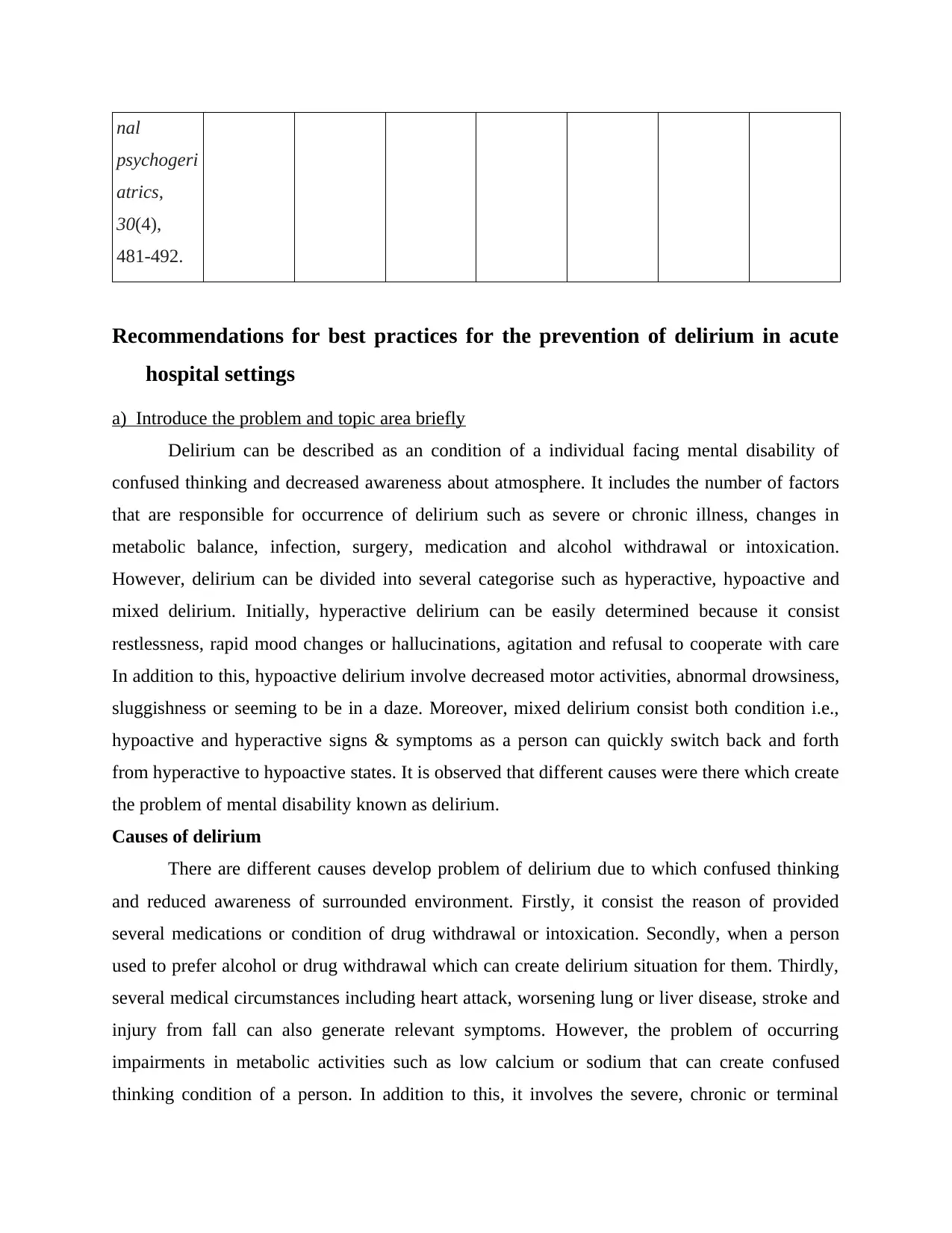
nal
psychogeri
atrics,
30(4),
481-492.
Recommendations for best practices for the prevention of delirium in acute
hospital settings
a) Introduce the problem and topic area briefly
Delirium can be described as an condition of a individual facing mental disability of
confused thinking and decreased awareness about atmosphere. It includes the number of factors
that are responsible for occurrence of delirium such as severe or chronic illness, changes in
metabolic balance, infection, surgery, medication and alcohol withdrawal or intoxication.
However, delirium can be divided into several categorise such as hyperactive, hypoactive and
mixed delirium. Initially, hyperactive delirium can be easily determined because it consist
restlessness, rapid mood changes or hallucinations, agitation and refusal to cooperate with care
In addition to this, hypoactive delirium involve decreased motor activities, abnormal drowsiness,
sluggishness or seeming to be in a daze. Moreover, mixed delirium consist both condition i.e.,
hypoactive and hyperactive signs & symptoms as a person can quickly switch back and forth
from hyperactive to hypoactive states. It is observed that different causes were there which create
the problem of mental disability known as delirium.
Causes of delirium
There are different causes develop problem of delirium due to which confused thinking
and reduced awareness of surrounded environment. Firstly, it consist the reason of provided
several medications or condition of drug withdrawal or intoxication. Secondly, when a person
used to prefer alcohol or drug withdrawal which can create delirium situation for them. Thirdly,
several medical circumstances including heart attack, worsening lung or liver disease, stroke and
injury from fall can also generate relevant symptoms. However, the problem of occurring
impairments in metabolic activities such as low calcium or sodium that can create confused
thinking condition of a person. In addition to this, it involves the severe, chronic or terminal
psychogeri
atrics,
30(4),
481-492.
Recommendations for best practices for the prevention of delirium in acute
hospital settings
a) Introduce the problem and topic area briefly
Delirium can be described as an condition of a individual facing mental disability of
confused thinking and decreased awareness about atmosphere. It includes the number of factors
that are responsible for occurrence of delirium such as severe or chronic illness, changes in
metabolic balance, infection, surgery, medication and alcohol withdrawal or intoxication.
However, delirium can be divided into several categorise such as hyperactive, hypoactive and
mixed delirium. Initially, hyperactive delirium can be easily determined because it consist
restlessness, rapid mood changes or hallucinations, agitation and refusal to cooperate with care
In addition to this, hypoactive delirium involve decreased motor activities, abnormal drowsiness,
sluggishness or seeming to be in a daze. Moreover, mixed delirium consist both condition i.e.,
hypoactive and hyperactive signs & symptoms as a person can quickly switch back and forth
from hyperactive to hypoactive states. It is observed that different causes were there which create
the problem of mental disability known as delirium.
Causes of delirium
There are different causes develop problem of delirium due to which confused thinking
and reduced awareness of surrounded environment. Firstly, it consist the reason of provided
several medications or condition of drug withdrawal or intoxication. Secondly, when a person
used to prefer alcohol or drug withdrawal which can create delirium situation for them. Thirdly,
several medical circumstances including heart attack, worsening lung or liver disease, stroke and
injury from fall can also generate relevant symptoms. However, the problem of occurring
impairments in metabolic activities such as low calcium or sodium that can create confused
thinking condition of a person. In addition to this, it involves the severe, chronic or terminal
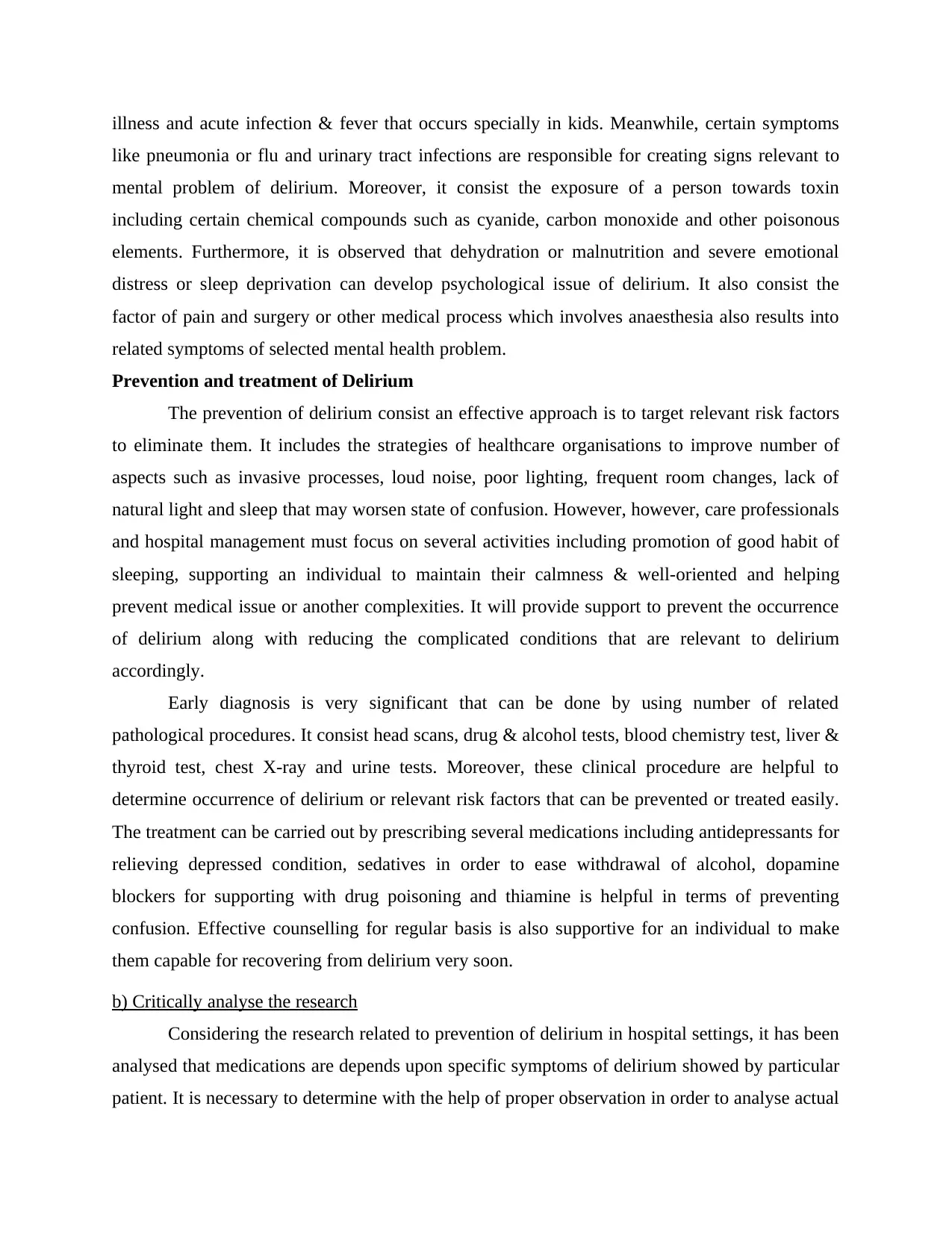
illness and acute infection & fever that occurs specially in kids. Meanwhile, certain symptoms
like pneumonia or flu and urinary tract infections are responsible for creating signs relevant to
mental problem of delirium. Moreover, it consist the exposure of a person towards toxin
including certain chemical compounds such as cyanide, carbon monoxide and other poisonous
elements. Furthermore, it is observed that dehydration or malnutrition and severe emotional
distress or sleep deprivation can develop psychological issue of delirium. It also consist the
factor of pain and surgery or other medical process which involves anaesthesia also results into
related symptoms of selected mental health problem.
Prevention and treatment of Delirium
The prevention of delirium consist an effective approach is to target relevant risk factors
to eliminate them. It includes the strategies of healthcare organisations to improve number of
aspects such as invasive processes, loud noise, poor lighting, frequent room changes, lack of
natural light and sleep that may worsen state of confusion. However, however, care professionals
and hospital management must focus on several activities including promotion of good habit of
sleeping, supporting an individual to maintain their calmness & well-oriented and helping
prevent medical issue or another complexities. It will provide support to prevent the occurrence
of delirium along with reducing the complicated conditions that are relevant to delirium
accordingly.
Early diagnosis is very significant that can be done by using number of related
pathological procedures. It consist head scans, drug & alcohol tests, blood chemistry test, liver &
thyroid test, chest X-ray and urine tests. Moreover, these clinical procedure are helpful to
determine occurrence of delirium or relevant risk factors that can be prevented or treated easily.
The treatment can be carried out by prescribing several medications including antidepressants for
relieving depressed condition, sedatives in order to ease withdrawal of alcohol, dopamine
blockers for supporting with drug poisoning and thiamine is helpful in terms of preventing
confusion. Effective counselling for regular basis is also supportive for an individual to make
them capable for recovering from delirium very soon.
b) Critically analyse the research
Considering the research related to prevention of delirium in hospital settings, it has been
analysed that medications are depends upon specific symptoms of delirium showed by particular
patient. It is necessary to determine with the help of proper observation in order to analyse actual
like pneumonia or flu and urinary tract infections are responsible for creating signs relevant to
mental problem of delirium. Moreover, it consist the exposure of a person towards toxin
including certain chemical compounds such as cyanide, carbon monoxide and other poisonous
elements. Furthermore, it is observed that dehydration or malnutrition and severe emotional
distress or sleep deprivation can develop psychological issue of delirium. It also consist the
factor of pain and surgery or other medical process which involves anaesthesia also results into
related symptoms of selected mental health problem.
Prevention and treatment of Delirium
The prevention of delirium consist an effective approach is to target relevant risk factors
to eliminate them. It includes the strategies of healthcare organisations to improve number of
aspects such as invasive processes, loud noise, poor lighting, frequent room changes, lack of
natural light and sleep that may worsen state of confusion. However, however, care professionals
and hospital management must focus on several activities including promotion of good habit of
sleeping, supporting an individual to maintain their calmness & well-oriented and helping
prevent medical issue or another complexities. It will provide support to prevent the occurrence
of delirium along with reducing the complicated conditions that are relevant to delirium
accordingly.
Early diagnosis is very significant that can be done by using number of related
pathological procedures. It consist head scans, drug & alcohol tests, blood chemistry test, liver &
thyroid test, chest X-ray and urine tests. Moreover, these clinical procedure are helpful to
determine occurrence of delirium or relevant risk factors that can be prevented or treated easily.
The treatment can be carried out by prescribing several medications including antidepressants for
relieving depressed condition, sedatives in order to ease withdrawal of alcohol, dopamine
blockers for supporting with drug poisoning and thiamine is helpful in terms of preventing
confusion. Effective counselling for regular basis is also supportive for an individual to make
them capable for recovering from delirium very soon.
b) Critically analyse the research
Considering the research related to prevention of delirium in hospital settings, it has been
analysed that medications are depends upon specific symptoms of delirium showed by particular
patient. It is necessary to determine with the help of proper observation in order to analyse actual
⊘ This is a preview!⊘
Do you want full access?
Subscribe today to unlock all pages.

Trusted by 1+ million students worldwide
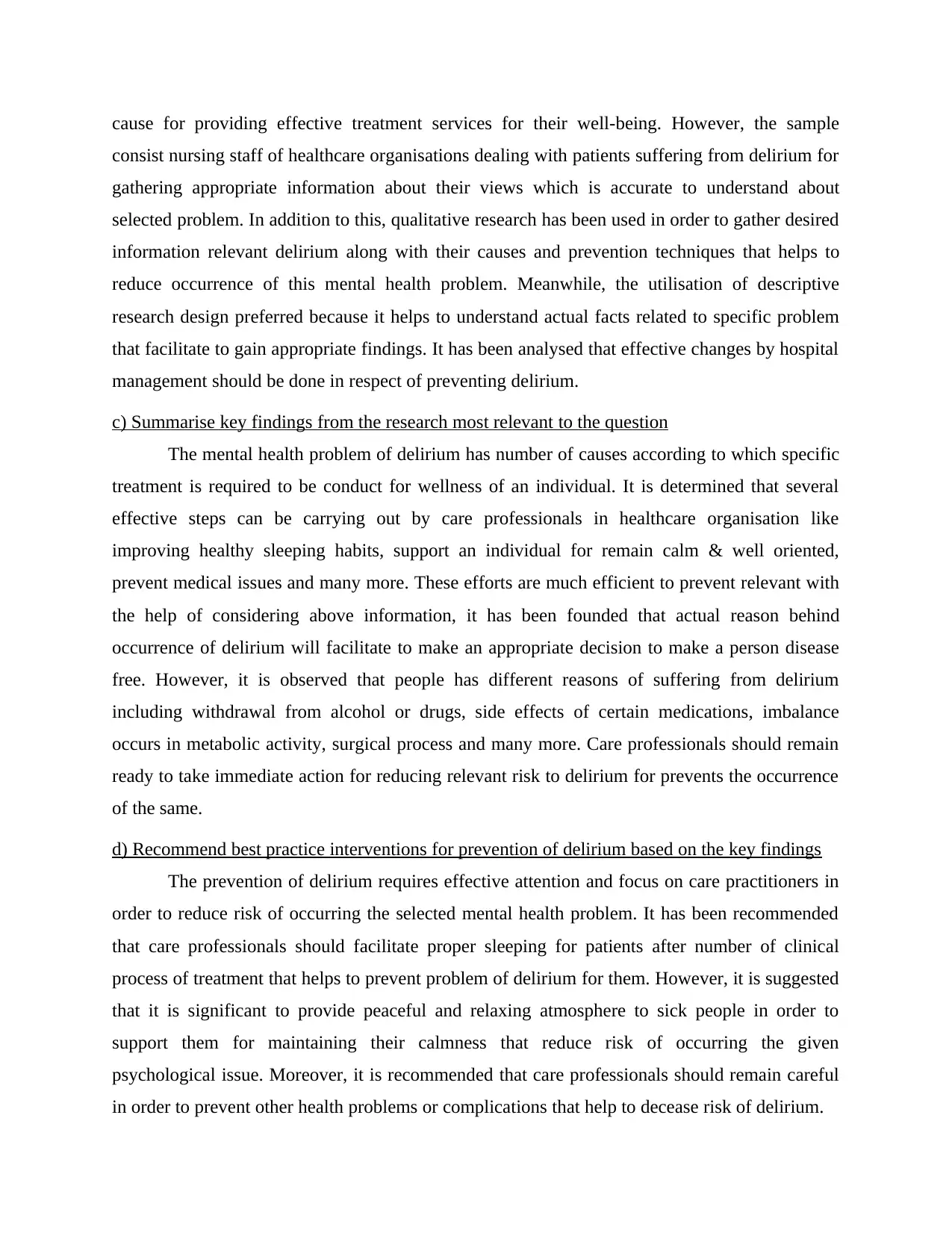
cause for providing effective treatment services for their well-being. However, the sample
consist nursing staff of healthcare organisations dealing with patients suffering from delirium for
gathering appropriate information about their views which is accurate to understand about
selected problem. In addition to this, qualitative research has been used in order to gather desired
information relevant delirium along with their causes and prevention techniques that helps to
reduce occurrence of this mental health problem. Meanwhile, the utilisation of descriptive
research design preferred because it helps to understand actual facts related to specific problem
that facilitate to gain appropriate findings. It has been analysed that effective changes by hospital
management should be done in respect of preventing delirium.
c) Summarise key findings from the research most relevant to the question
The mental health problem of delirium has number of causes according to which specific
treatment is required to be conduct for wellness of an individual. It is determined that several
effective steps can be carrying out by care professionals in healthcare organisation like
improving healthy sleeping habits, support an individual for remain calm & well oriented,
prevent medical issues and many more. These efforts are much efficient to prevent relevant with
the help of considering above information, it has been founded that actual reason behind
occurrence of delirium will facilitate to make an appropriate decision to make a person disease
free. However, it is observed that people has different reasons of suffering from delirium
including withdrawal from alcohol or drugs, side effects of certain medications, imbalance
occurs in metabolic activity, surgical process and many more. Care professionals should remain
ready to take immediate action for reducing relevant risk to delirium for prevents the occurrence
of the same.
d) Recommend best practice interventions for prevention of delirium based on the key findings
The prevention of delirium requires effective attention and focus on care practitioners in
order to reduce risk of occurring the selected mental health problem. It has been recommended
that care professionals should facilitate proper sleeping for patients after number of clinical
process of treatment that helps to prevent problem of delirium for them. However, it is suggested
that it is significant to provide peaceful and relaxing atmosphere to sick people in order to
support them for maintaining their calmness that reduce risk of occurring the given
psychological issue. Moreover, it is recommended that care professionals should remain careful
in order to prevent other health problems or complications that help to decease risk of delirium.
consist nursing staff of healthcare organisations dealing with patients suffering from delirium for
gathering appropriate information about their views which is accurate to understand about
selected problem. In addition to this, qualitative research has been used in order to gather desired
information relevant delirium along with their causes and prevention techniques that helps to
reduce occurrence of this mental health problem. Meanwhile, the utilisation of descriptive
research design preferred because it helps to understand actual facts related to specific problem
that facilitate to gain appropriate findings. It has been analysed that effective changes by hospital
management should be done in respect of preventing delirium.
c) Summarise key findings from the research most relevant to the question
The mental health problem of delirium has number of causes according to which specific
treatment is required to be conduct for wellness of an individual. It is determined that several
effective steps can be carrying out by care professionals in healthcare organisation like
improving healthy sleeping habits, support an individual for remain calm & well oriented,
prevent medical issues and many more. These efforts are much efficient to prevent relevant with
the help of considering above information, it has been founded that actual reason behind
occurrence of delirium will facilitate to make an appropriate decision to make a person disease
free. However, it is observed that people has different reasons of suffering from delirium
including withdrawal from alcohol or drugs, side effects of certain medications, imbalance
occurs in metabolic activity, surgical process and many more. Care professionals should remain
ready to take immediate action for reducing relevant risk to delirium for prevents the occurrence
of the same.
d) Recommend best practice interventions for prevention of delirium based on the key findings
The prevention of delirium requires effective attention and focus on care practitioners in
order to reduce risk of occurring the selected mental health problem. It has been recommended
that care professionals should facilitate proper sleeping for patients after number of clinical
process of treatment that helps to prevent problem of delirium for them. However, it is suggested
that it is significant to provide peaceful and relaxing atmosphere to sick people in order to
support them for maintaining their calmness that reduce risk of occurring the given
psychological issue. Moreover, it is recommended that care professionals should remain careful
in order to prevent other health problems or complications that help to decease risk of delirium.
Paraphrase This Document
Need a fresh take? Get an instant paraphrase of this document with our AI Paraphraser
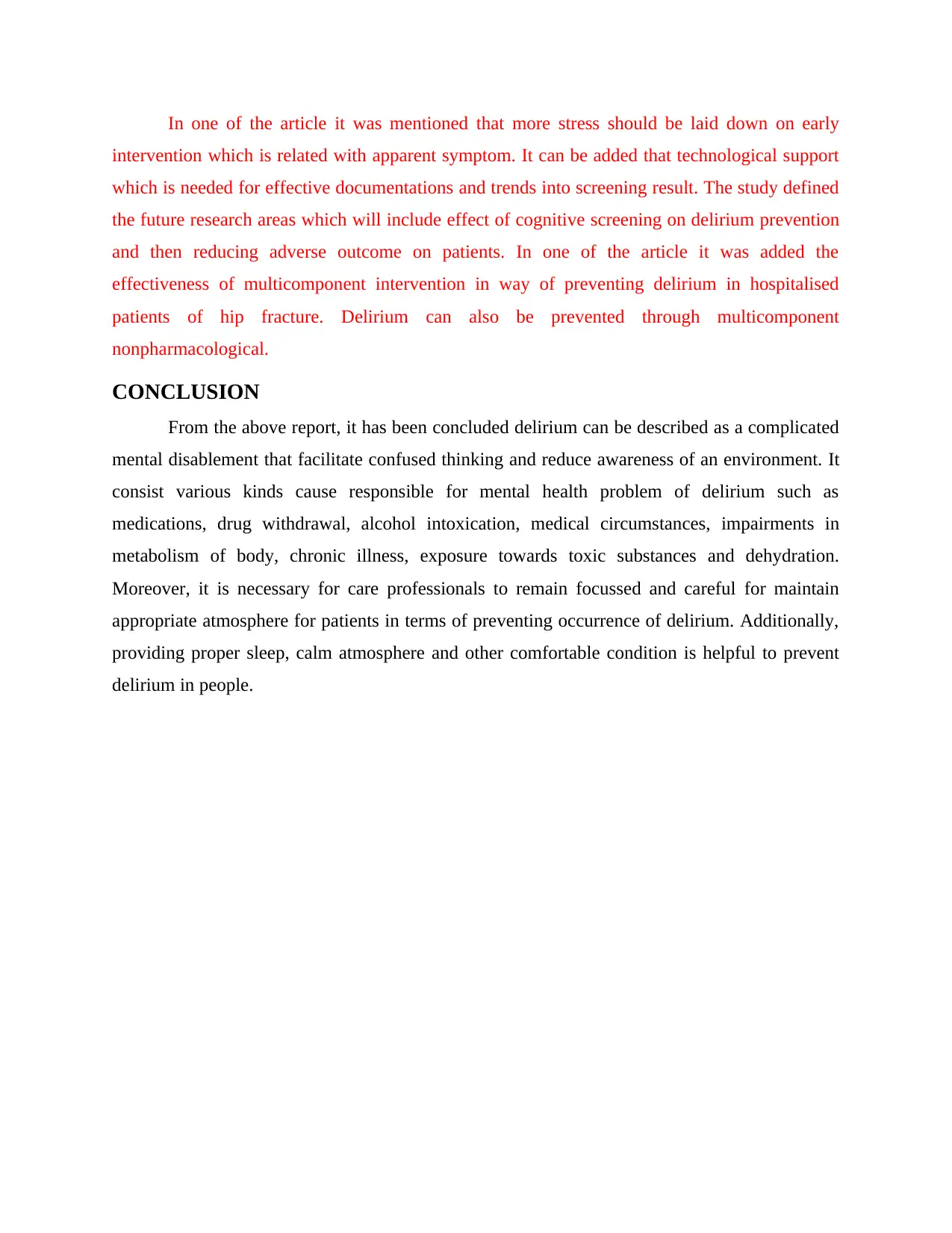
In one of the article it was mentioned that more stress should be laid down on early
intervention which is related with apparent symptom. It can be added that technological support
which is needed for effective documentations and trends into screening result. The study defined
the future research areas which will include effect of cognitive screening on delirium prevention
and then reducing adverse outcome on patients. In one of the article it was added the
effectiveness of multicomponent intervention in way of preventing delirium in hospitalised
patients of hip fracture. Delirium can also be prevented through multicomponent
nonpharmacological.
CONCLUSION
From the above report, it has been concluded delirium can be described as a complicated
mental disablement that facilitate confused thinking and reduce awareness of an environment. It
consist various kinds cause responsible for mental health problem of delirium such as
medications, drug withdrawal, alcohol intoxication, medical circumstances, impairments in
metabolism of body, chronic illness, exposure towards toxic substances and dehydration.
Moreover, it is necessary for care professionals to remain focussed and careful for maintain
appropriate atmosphere for patients in terms of preventing occurrence of delirium. Additionally,
providing proper sleep, calm atmosphere and other comfortable condition is helpful to prevent
delirium in people.
intervention which is related with apparent symptom. It can be added that technological support
which is needed for effective documentations and trends into screening result. The study defined
the future research areas which will include effect of cognitive screening on delirium prevention
and then reducing adverse outcome on patients. In one of the article it was added the
effectiveness of multicomponent intervention in way of preventing delirium in hospitalised
patients of hip fracture. Delirium can also be prevented through multicomponent
nonpharmacological.
CONCLUSION
From the above report, it has been concluded delirium can be described as a complicated
mental disablement that facilitate confused thinking and reduce awareness of an environment. It
consist various kinds cause responsible for mental health problem of delirium such as
medications, drug withdrawal, alcohol intoxication, medical circumstances, impairments in
metabolism of body, chronic illness, exposure towards toxic substances and dehydration.
Moreover, it is necessary for care professionals to remain focussed and careful for maintain
appropriate atmosphere for patients in terms of preventing occurrence of delirium. Additionally,
providing proper sleep, calm atmosphere and other comfortable condition is helpful to prevent
delirium in people.
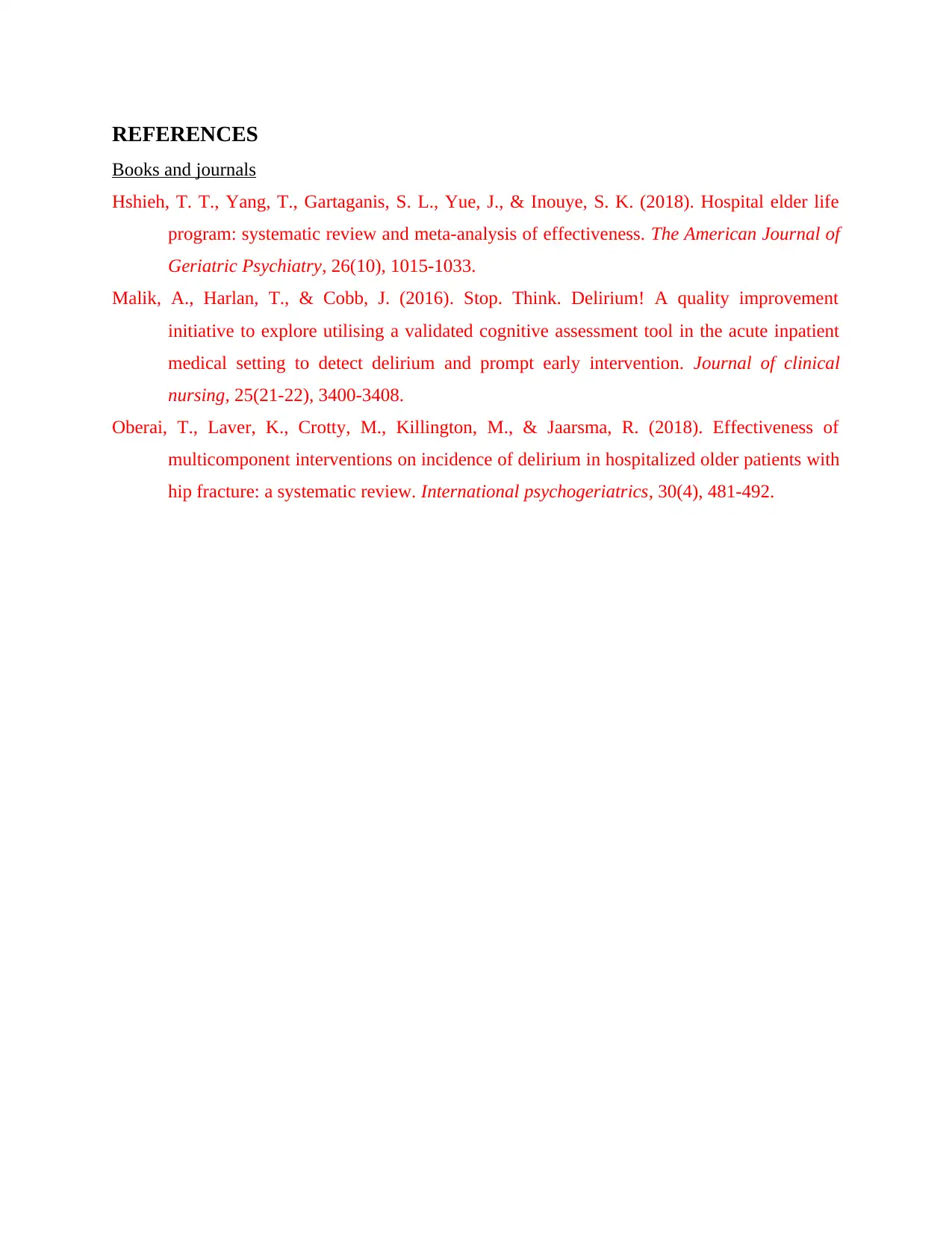
REFERENCES
Books and journals
Hshieh, T. T., Yang, T., Gartaganis, S. L., Yue, J., & Inouye, S. K. (2018). Hospital elder life
program: systematic review and meta-analysis of effectiveness. The American Journal of
Geriatric Psychiatry, 26(10), 1015-1033.
Malik, A., Harlan, T., & Cobb, J. (2016). Stop. Think. Delirium! A quality improvement
initiative to explore utilising a validated cognitive assessment tool in the acute inpatient
medical setting to detect delirium and prompt early intervention. Journal of clinical
nursing, 25(21-22), 3400-3408.
Oberai, T., Laver, K., Crotty, M., Killington, M., & Jaarsma, R. (2018). Effectiveness of
multicomponent interventions on incidence of delirium in hospitalized older patients with
hip fracture: a systematic review. International psychogeriatrics, 30(4), 481-492.
Books and journals
Hshieh, T. T., Yang, T., Gartaganis, S. L., Yue, J., & Inouye, S. K. (2018). Hospital elder life
program: systematic review and meta-analysis of effectiveness. The American Journal of
Geriatric Psychiatry, 26(10), 1015-1033.
Malik, A., Harlan, T., & Cobb, J. (2016). Stop. Think. Delirium! A quality improvement
initiative to explore utilising a validated cognitive assessment tool in the acute inpatient
medical setting to detect delirium and prompt early intervention. Journal of clinical
nursing, 25(21-22), 3400-3408.
Oberai, T., Laver, K., Crotty, M., Killington, M., & Jaarsma, R. (2018). Effectiveness of
multicomponent interventions on incidence of delirium in hospitalized older patients with
hip fracture: a systematic review. International psychogeriatrics, 30(4), 481-492.
⊘ This is a preview!⊘
Do you want full access?
Subscribe today to unlock all pages.

Trusted by 1+ million students worldwide
1 out of 12
Related Documents
Your All-in-One AI-Powered Toolkit for Academic Success.
+13062052269
info@desklib.com
Available 24*7 on WhatsApp / Email
![[object Object]](/_next/static/media/star-bottom.7253800d.svg)
Unlock your academic potential
Copyright © 2020–2026 A2Z Services. All Rights Reserved. Developed and managed by ZUCOL.





